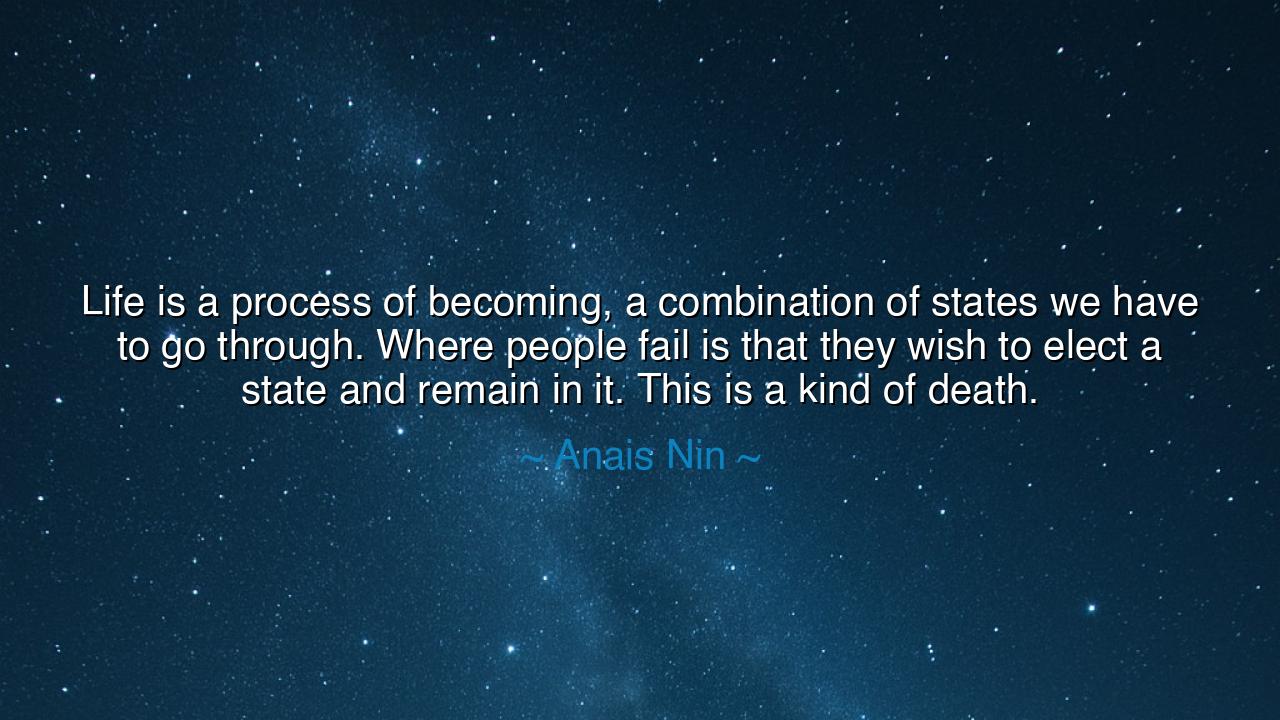
Life is a process of becoming, a combination of states we have to
Life is a process of becoming, a combination of states we have to go through. Where people fail is that they wish to elect a state and remain in it. This is a kind of death.






“Life is a process of becoming, a combination of states we have to go through. Where people fail is that they wish to elect a state and remain in it. This is a kind of death.” Thus wrote Anaïs Nin, the diarist of the soul, whose words burn with the fire of transformation. In this reflection, she teaches that life is not a fixed condition, but a flowing river — a ceaseless unfolding of the self. The human spirit, she says, was not born to stand still. It was born to move, to change, to dissolve and reform again. Those who try to preserve themselves unchanged — to dwell forever in one certainty, one comfort, one identity — commit a subtle form of suicide, for they deny the eternal law of growth.
The origin of this quote comes from Nin’s deep exploration of identity and inner evolution. Her journals were not mere records of events, but spiritual experiments — chronicles of how a person might live truthfully amid the flux of experience. She lived through eras of chaos and modern reinvention, where women, artists, and thinkers alike were breaking from the molds of the past. Nin understood that to become is to live — to be continually reshaped by passion, pain, and discovery. But she also saw how easily human beings fall into the temptation of permanence. The mind seeks safety, the heart seeks stability, and the ego whispers: Stay here, for this is who you are. Yet life, like the tide, will not be still.
To elect a state and remain in it — whether it be comfort, identity, or belief — is to defy the nature of the universe itself. The ancients knew this truth. Heraclitus, the philosopher of change, declared that “you cannot step into the same river twice,” for the waters are always moving, and so are you. Nin’s wisdom echoes that same current. She reminds us that stagnation, however peaceful it may appear, leads not to fulfillment but to decay. A tree that ceases to grow begins to die. A soul that ceases to change hardens into stone. To cling to what we once were — out of fear of losing it — is to lose what we might yet become.
There is a story told of Siddhartha Gautama, who, in his youth, was sheltered by his father in a palace of endless pleasure, safe from pain and change. Yet one day he slipped beyond the gates and saw sickness, age, and death — the unavoidable truths of existence. That moment shattered his illusion of permanence and set him on the path to enlightenment. He learned that to live is to transform, and that freedom lies not in resisting change, but in embracing it with open eyes. In this, he and Nin speak the same truth across millennia: that life’s greatest peace is found not in stillness, but in motion — in the courage to evolve.
Nin’s words also speak to the creative spirit. The artist who repeats yesterday’s work out of fear of failure dies spiritually, even while living. The thinker who refuses to question his old truths becomes a prisoner of his own mind. The lover who clings to yesterday’s passion, refusing to let it change, finds that it withers in his hands. To live fully is to accept the death of former selves, again and again, as one might shed a skin to reveal new life beneath. Each ending is a beginning in disguise; each surrender opens the door to renewal.
But this process of becoming is not easy. It demands courage — the courage to step into uncertainty, to lose the familiar, to trust that growth is worth the discomfort it brings. Many resist this call, choosing the dull safety of sameness over the risk of transformation. Yet Nin warns that this choice leads to the slow death of the soul. The body may live on, but without change, without striving, the inner flame dwindles. The ancient alchemists spoke of turning lead into gold, but Nin knew that the true alchemy is the transformation of the self — the willingness to burn away what no longer serves, so that something brighter may emerge.
So, my listener, take this wisdom to heart: do not fear change — fear the refusal to change. Let each phase of your life pass through you like the seasons through the earth. When joy comes, embrace it; when loss arrives, learn from it; when a new path appears, walk it. Never say, “I have arrived,” for the moment you do, the journey ends. Instead, say, “I am becoming,” and know that this becoming is the essence of life itself. As Anaïs Nin teaches, to evolve is to live, and to cling is to perish. Therefore, keep moving — not away from yourself, but ever deeper into who you are meant to be.






AAdministratorAdministrator
Welcome, honored guests. Please leave a comment, we will respond soon